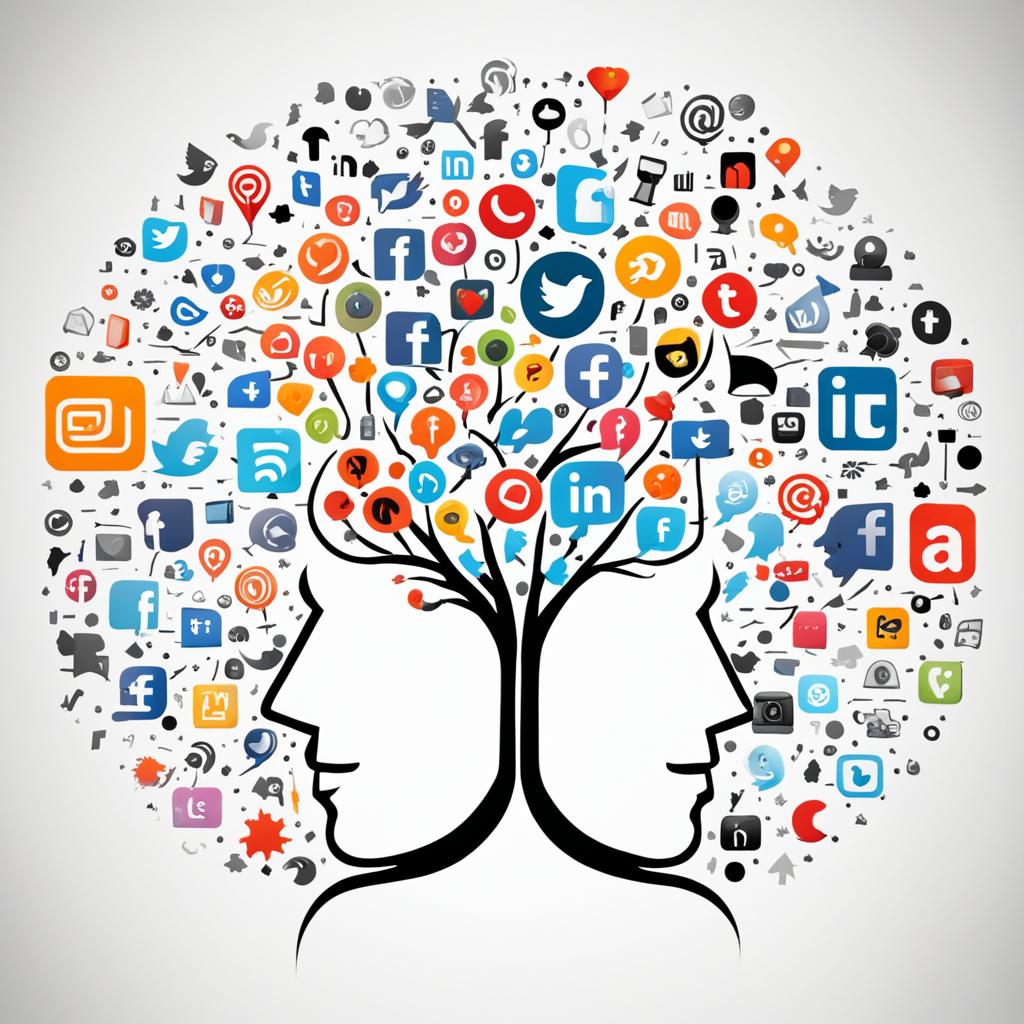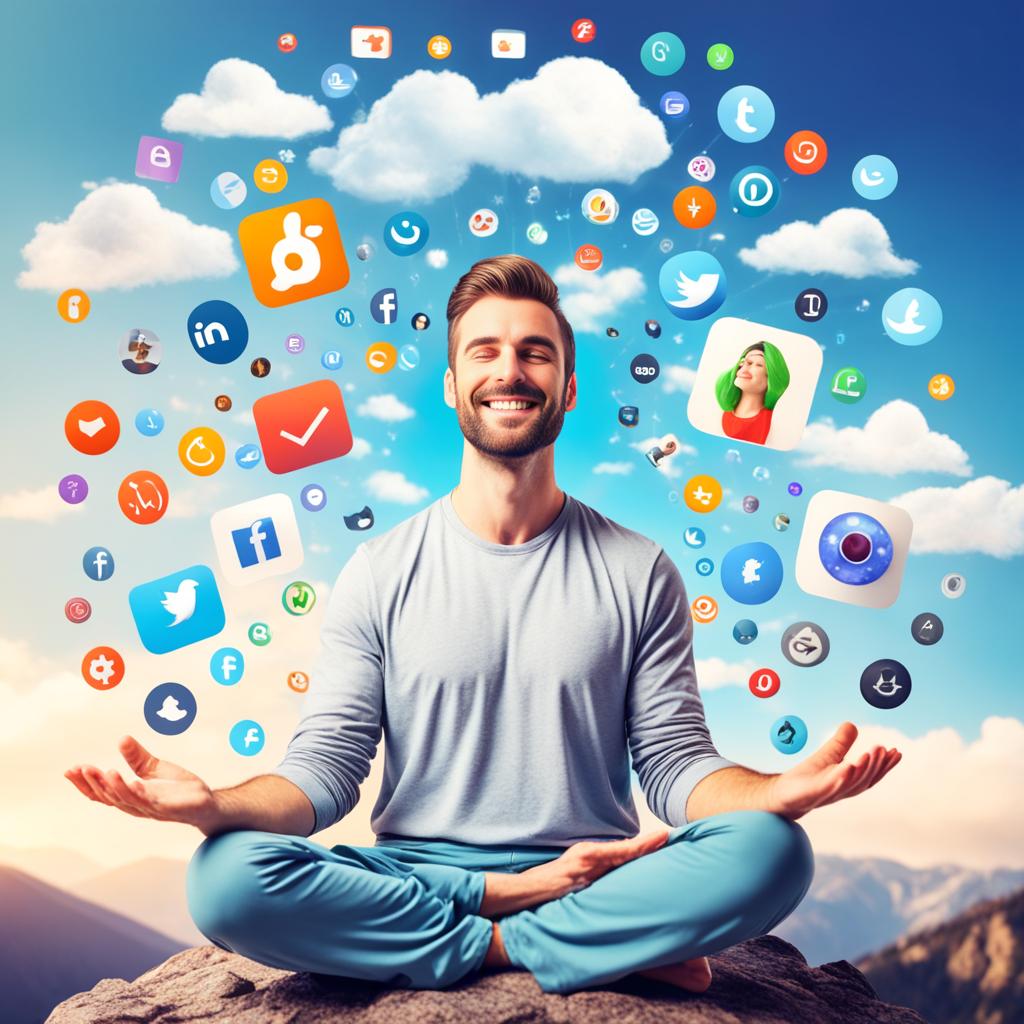Did you know that as of 2021, there are approximately 4.33 billion active social media users worldwide? That’s more than half of the global population, and it’s a number that continues to grow rapidly. Social media has undeniably become an integral part of our lives, connecting us to friends, family, and the world at large. However, with its widespread use comes both benefits and drawbacks for our mental health and digital well-being.
In this article, we will delve into the various ways in which social media impacts our mental health. We will explore the positive effects, such as the support and connection it can provide, as well as the negative effects, including cyberbullying and social comparison. Additionally, we will discuss strategies for maintaining a healthy relationship with social media and nurturing positive digital well-being. So let’s dive in and explore the complex relationship between social media and our mental health.
Understanding the Influence of Social Media
Social media platforms have become an inseparable part of our lives, deeply impacting our behaviors, emotions, and perceptions. The influence of social media on our mental health cannot be ignored.
Social media has the power to shape our thoughts and actions, often without us even realizing it. From influencing our opinions and beliefs to affecting our self-esteem and body image, social media has a profound impact on our well-being.
Through the constant exposure to curated content, we tend to compare ourselves to others, leading to feelings of inadequacy, envy, and even anxiety. The pressure to present a perfect image of ourselves on social media can contribute to a negative impact on our mental health.
Moreover, the validation we seek through likes, comments, and followers can significantly influence our self-worth and self-esteem. The constant need for external validation can create a dependency on social media, affecting our overall psychological well-being.
“Social media is like water; it can be a source of nourishment or a drowning force, depending on how we navigate it.” – Anonymous
However, it’s important to note that social media is not inherently negative. It has the potential to be a powerful tool for connection, awareness, and positive change. Platforms like Facebook, Instagram, and Twitter have brought people together, fostering communities and support networks for individuals who may otherwise feel isolated.
Additionally, social media provides access to valuable resources and information related to mental health, encouraging awareness and conversation around mental well-being. It offers a platform for individuals to share their stories, helping destigmatize mental health issues and providing hope to those who may be struggling.
Understanding the influence of social media on our mental health is crucial in navigating this digital landscape. By being aware of its impact, we can make informed choices about our social media usage, ensuring it contributes positively to our overall well-being.
As we explore the positive and negative aspects of social media on mental health in the upcoming sections, it is essential to consider how our digital experiences shape our offline realities.


The Benefits of Social Media on Mental Health
Social media often gets a bad rap when it comes to mental health, but it’s important to recognize that there are also many benefits it can offer. When used mindfully and responsibly, social media platforms can provide numerous advantages for our mental well-being.
One of the key benefits of social media is its ability to connect people. Whether it’s rekindling old friendships, finding support for shared experiences, or connecting with like-minded individuals, social media creates a sense of belonging and community. This connection can play a significant role in combating feelings of loneliness and isolation, which are detrimental to mental health.
Social media platforms also serve as valuable tools for accessing mental health resources. Many organizations and professionals use social media to disseminate information, share strategies for managing mental health, and raise awareness about various conditions. This accessibility makes it easier for individuals to educate themselves and seek the help they need.
Additionally, social media can provide a space for support and empathy. Online communities and support groups can offer a sense of understanding, as individuals facing similar challenges can connect and offer guidance to one another. This virtual support system can be especially beneficial for those who may not have access to in-person support networks.
“Social media allows individuals to share their experiences and learn from others facing similar challenges. It creates a sense of validation and support that can have a positive impact on mental well-being.”
Furthermore, social media platforms offer a platform for self-expression and creative outlets. Many individuals use social media to showcase their talents, share their passions, and express themselves in ways that boost self-esteem and promote positive self-image.
Lastly, social media can serve as a source of inspiration, motivation, and education. From motivational quotes and inspiring stories to educational videos and articles, social media provides a wealth of content that can uplift and enlighten. This exposure to positivity and knowledge can contribute to personal growth and enhance overall mental well-being.
In conclusion, while it’s important to be aware of the potential negative impact of social media on mental health, we must also acknowledge the benefits it can offer. Social media has the power to connect, support, inform, and inspire individuals, ultimately contributing to improved mental well-being.
<!–
List of Benefits:
- Connection and community
- Access to mental health resources
- Support and empathy
- Self-expression and creativity
- Inspiration, motivation, and education
–><!–
Quote:
“Social media allows individuals to share their experiences and learn from others facing similar challenges. It creates a sense of validation and support that can have a positive impact on mental well-being.”
–><!–
Image:


The Dark Side of Social Media and Mental Health
Social media has undoubtedly revolutionized the way we connect and communicate with others, but it also has a darker side that can significantly impact our mental health. In this section, we will explore some of the negative effects that social media can have on our well-being, shedding light on the potential risks and challenges associated with its use.
The Impact of Cyberbullying
Cyberbullying has become a pervasive issue on social media platforms, with individuals facing harassment and abuse online. The anonymity and distance provided by social media can embolden bullies, making it easier for them to target and harm others. The constant exposure to negative remarks and hurtful comments can have a profound impact on mental health, leading to feelings of anxiety, depression, and even suicidal ideation.
The Perils of Social Comparison
“Comparison is the thief of joy.”
Social media platforms often cultivate an environment where people showcase their highlight reels, creating a distorted sense of reality. Constant exposure to carefully curated images and updates from others can lead to social comparison, triggering feelings of inadequacy, low self-esteem, and a negative self-image. It can be challenging to maintain a healthy perspective and remember that what we see online is often a highly edited version of someone’s life.
The Potential for Addictive Behaviors
Social media platforms are designed to be addictive, utilizing various psychological mechanisms to keep users engaged for extended periods. The constant stream of notifications, likes, and comments triggers the release of dopamine, a neurotransmitter associated with pleasure and reward. Over time, individuals can develop compulsive behaviors, constantly seeking validation and affirmation through social media interactions. This addiction, known as social media dependency, can have detrimental effects on mental health, leading to feelings of anxiety, isolation, and a decreased sense of self-worth.


As we navigate the landscape of social media, it is crucial to be aware of the potential dark side that exists alongside its benefits. By understanding the negative effects of cyberbullying, social comparison, and addictive behaviors, we can better protect our mental health and develop healthier relationships with these platforms.
Digital Well-being and the Role of Social Media
Understanding the concept of digital well-being is crucial in today’s hyperconnected world. As we spend more time on social media platforms, it becomes essential to recognize the impact it has on our mental health and overall well-being.
Social media plays a significant role in shaping our online experiences. It has become a platform for self-expression, social interaction, and information sharing. However, excessive or unhealthy use of social media can have negative effects on our mental health.
In order to maintain a healthy relationship with social media, it is important to practice digital well-being. This involves being mindful of our online activities, setting boundaries, and prioritizing our mental health. Here are some strategies to consider:
- Define your goals: With a clear understanding of why you use social media, you can align your interactions with your personal values and interests.
- Limit screen time: Set boundaries on the amount of time you spend on social media each day. This can help reduce the risk of excessive use and its negative impact on mental health.
- Curate your feed: Be selective about the content you consume on social media. Unfollow accounts that leave you feeling anxious or inadequate, and follow accounts that promote positivity and inspiration.
- Practice digital detox: Take regular breaks from social media to recharge and focus on real-life experiences. Use this time to engage in activities that promote your well-being, such as spending time in nature or pursuing hobbies.
“Digital well-being is all about finding a balance in your online life. It’s about using social media in a way that enhances your mental health rather than detracting from it. Remember, you have the power to control your social media experience.”
— Dr. Samantha Johnson, Psychologist
By adopting these strategies, you can mitigate the negative effects of social media on your mental health and promote a healthier digital well-being. Remember that social media should enhance your life, not consume it.


Next, we will explore the psychological mechanisms at play when we engage with social media and how they impact our mental health.
Psychological Mechanisms at Play
When we engage with social media, various psychological mechanisms come into play, influencing our thoughts, emotions, and behaviors. These mechanisms play a significant role in shaping our experiences and can have both positive and negative effects on our mental health.
Self-esteem: Social media platforms often serve as a space for self-expression and self-presentation. They can impact our self-esteem as we seek validation and approval from others through likes, comments, and followers.
Social comparison is another psychological mechanism prevalent on social media. We often compare ourselves to others, particularly when we see their highlight reels, which can lead to feelings of inadequacy, envy, and diminished self-worth.
Fear of Missing Out (FOMO): Social media exposes us to various events and activities happening in the lives of others. This constant exposure can generate a fear of missing out on meaningful experiences, leading to anxiety and a desire to be constantly connected.
Understanding these psychological mechanisms is essential in navigating the impact of social media on our mental health. By recognizing how they influence our thoughts and emotions, we can take proactive steps to mitigate their negative effects and harness their positive potential.
Mitigating the Negative Effects of Social Media on Mental Health
While social media has become an integral part of our daily lives, it’s essential to be aware of its potential negative impact on our mental health. The constant exposure to curated images, the fear of missing out (FOMO), and the incessant need for validation can all contribute to feelings of anxiety, loneliness, and low self-esteem.
However, there are strategies you can employ to mitigate these negative effects and create a healthier relationship with social media. By incorporating the following tips into your digital routine, you can prioritize your mental well-being:
- Limit your social media usage: Set boundaries for the amount of time you spend on social media each day. This can help reduce the potential negative effects and free up time for other activities that promote well-being.
- Cultivate a positive online environment: Unfollow accounts that make you feel insecure or trigger negative emotions. Instead, follow accounts that inspire, uplift, and promote positivity.
- Practice mindful scrolling: Be conscious of your emotional responses while scrolling through your social media feed. If you notice feelings of envy, inadequacy, or sadness, take a break and engage in activities that boost your mood.
- Engage in real-life connections: Balance your online interactions with face-to-face connections. Foster meaningful relationships with friends and family through regular offline activities and conversations.
- Seek support: If you feel overwhelmed by the negative effects of social media on your mental health, don’t hesitate to reach out for professional help. Therapists, counselors, and support groups can provide valuable guidance and support.
“We have to allow ourselves to be loved by the people who really love us, the people who really matter. Too much of the time, we are blinded by our own pursuits of people to love us, people that don’t even matter, while all that time we waste and the people who do love us have to stand on the sidewalk and watch us beg in the streets! It’s time to put an end to this. It’s time for us to let ourselves be loved.” – C. JoyBell C.
It’s important to remember that social media is a tool that can be used both positively and negatively. By implementing these strategies, you can mitigate the negative effects, foster a healthier digital environment, and prioritize your mental well-being.


Nurturing Positive Digital Well-being
In today’s digital age, it’s important to prioritize our mental well-being while using social media. By adopting certain activities and practices, we can foster positive digital well-being and maintain a healthier relationship with the online world. Here are some suggestions to help you navigate the digital landscape with intention, promoting a nurturing and positive experience.
1. Digital Detox
Take breaks from social media and digital devices. Engage in activities that don’t involve screens, such as reading a book, going for a walk, or spending quality time with loved ones. Disconnecting from social media allows you to recharge and regain clarity, reducing the potential stress and anxieties associated with online interactions.
2. Setting Boundaries
Establish boundaries around your social media usage. Set specific time limits for yourself and stick to them. Avoid mindlessly scrolling through feeds or checking social media before bed, as this can disrupt your sleep patterns. Being mindful of how and when you engage with social media helps create a healthier balance in your digital life.
3. Cultivating Meaningful Online Connections
Focus on building genuine and meaningful connections with others online. Engage with positive content and participate in conversations that uplift and inspire you. Surrounding yourself with virtual communities that align with your interests and values can enhance your digital well-being and foster a sense of belonging.
“Strive to curate your online experience to one that supports your mental health and contributes positively to your life.” – [Your Name]
Remember, social media can be a powerful tool for connection, inspiration, and self-expression. By nurturing a positive digital well-being, we can maximize the benefits of social media while minimizing its potential negative impact on our mental health.
Conclusion
In this article, we have explored the various ways in which social media impacts our mental health and digital well-being. It is important to understand that social media can have both positive and negative effects on our mental health.
On one hand, social media can provide support, connection, and access to resources that promote mental well-being. It allows us to stay connected with loved ones, find communities of shared interests, and raise awareness about important mental health issues. On the other hand, social media can also contribute to negative effects such as cyberbullying, social comparison, and addictive behaviors that can harm our well-being.
Therefore, it is crucial for individuals to be mindful of their social media usage and prioritize their digital well-being. This includes setting boundaries, engaging in regular digital detoxes, and cultivating meaningful online connections. By understanding the psychological mechanisms at play and adopting strategies to mitigate the negative impact, we can nurture positive digital well-being and promote better mental health.
As social media continues to play a significant role in our lives, it is essential for individuals, communities, and platforms to come together to create a healthier digital environment. By fostering a culture that promotes empathy, kindness, and responsible use of social media, we can ensure that it becomes a positive force in enhancing our mental well-being.
